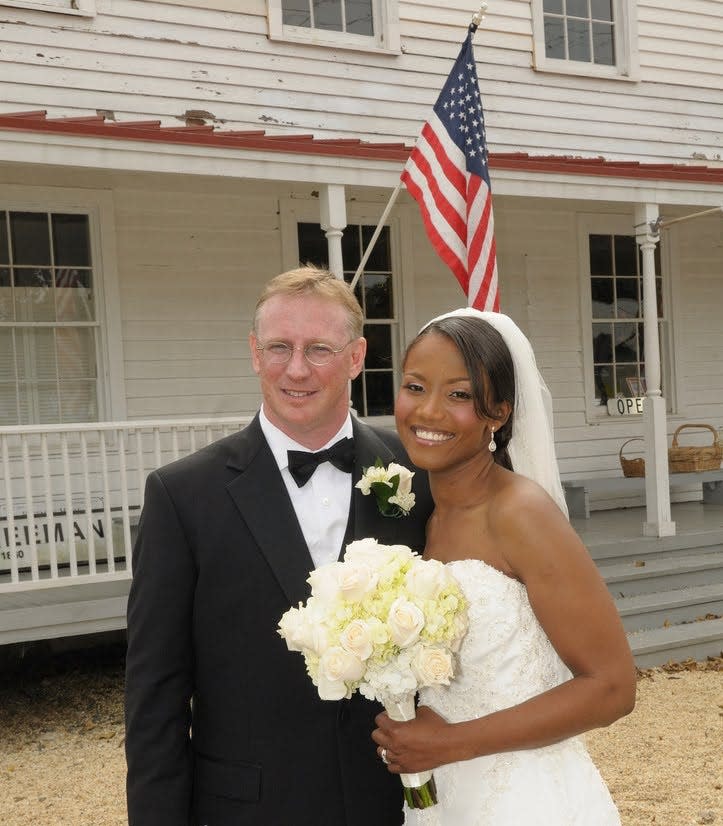My Capitol officer husband died by suicide. His death deserves 'line of duty' designation.
It has been a year since the Jan. 6 attack on the U.S. Capitol. My beloved husband, U.S. Capitol Police officer Howard “Howie” Liebengood, was on duty that day and continued to serve nearly around the clock on Jan. 7, Jan. 8 and Jan. 9 with minimal sleep between shifts. Sleep-deprived and exhausted, my husband took his life the night of Jan. 9. If it had not been for the events of Jan. 6 and the unremitting work schedule on the ensuing days, I believe my husband would still be here.
As anyone who has grieved a loved one knows, time is a strange thing. It’s hard to believe we are a year away from the events of that week; there are moments where it feels like this all happened yesterday. My grief is complicated by the fact that our family, including Howie’s siblings, finds ourselves at multiple intersecting points of American culture: the polarized political environment, the demands on first responders especially during a time of pandemic, and the national conversation around mental health and wellness.
Bureaucracy cripples just designations
One of the hardest discoveries has been encountering the culture and bureaucracy around line-of-duty designations. If a law enforcement officer commits suicide, even if it was in the context of a critical incident and its aftermath like Jan. 6, they are not eligible for a line-of-duty designation.
USA TODAY Editorial Board: U.S. Capitol combat shows why police deaths by suicides are sacrifices in the line of duty
This is significant, because that designation is used by various entities to determine everything from who is included on a list of fallen officers to other types of memorialization like lying in honor at the U.S. Capitol to the types of benefits their spouse and/or children receive.
It has been eye-opening to learn that the legal guidance and accompanying administrative processes around line of duty so clearly reflect our society’s continued struggle to acknowledge the importance of mental health beyond verbiage but in practice. Affected families are left wondering why, with all the advances in our understanding of mental health and trauma, suicide and post-traumatic stress disorder are not reflected in the designations. Put simply, the designation process reinforces stigma and fails to acknowledge the impact of work-related stressors on mental health.

There are several line-of-duty designation policies, through multiple entities, and they generally recognize that the nature of this work can result in harmful physical outcomes. For example, in at least one of these policies, if an officer engages in nonroutine stressful or strenuous activity as part of an emergency response or a training exercise, and that officer has a heart attack, that is considered a death in the line of duty.
If Howie had had a heart attack, we probably wouldn’t be fighting to get his death recognized and properly memorialized.
USA TODAY Editorial Board: Police who died by suicide after facing combat at U.S. Capitol need to be memorialized
Unfortunately, this is not a unique situation. Nationwide, estimates are that the risk of suicide among police officers is 54% greater than among American workers in general.
There is a lot to be done to change that, and many people have been doing work for years to bring attention to the issue and reduce stigma. As one part of those efforts, I think that officers and families affected by suicide deserve a review of the criteria used to determine an “in the line-of-duty designation.” We can act now to ensure a trauma-informed system.
A time for real change, not platitudes
I recognize that there is a larger conversation going on about policing and reform in this country. Focusing on structural changes – not just platitudes – about the importance of mental wellness and resilience for law enforcement is essential for all of us. We must do better to protect the well-being of law enforcement so they can continue to protect our communities.
What happens next? Democracy can survive if House committee investigating Jan. 6 Capitol riots does its job
Howie was a 15-year veteran of the U.S. Capitol Police. He was a 51-year-old husband, brother, uncle and valued friend to many. His omnipresent smile reflected his warm, gentle and compassionate personality. Howie’s loyalty to his job, his colleagues and his family and loved ones was palpable. His devotion to Congress, our country and service remains a beacon of light for his family members and community, and a reminder that relationships and people are what matter most.
I’m still picking up the pieces of my broken heart, but I’m also determined to bring positive change to the institutions that failed my Howie – not just because it’s the right thing to do, but because it's what Howie would have wanted.
Dr. Serena McClam Liebengood is a radiologist at Johns Hopkins Medicine and the widow of the late U.S. Capitol Police officer Howie C. Liebengood.
You can read diverse opinions from our Board of Contributors and other writers on the Opinion front page, on Twitter @usatodayopinion and in our daily Opinion newsletter. To respond to a column, submit a comment to letters@usatoday.com.
This article originally appeared on USA TODAY: Jan 6 Capitol Police officer line of duty: My husband died by suicide

